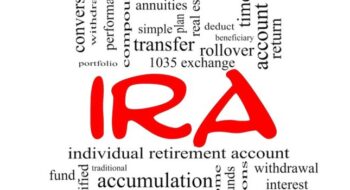In the previous Tax Report, we explored a recent legislation that mandates the increased
utilization of Roth 401(k) plans among individuals who are older and earn higher incomes. This
discussion sparked a multitude of inquiries from our readers regarding traditional and Roth IRAs,
401(k)s, and other comparable savings plans.
Key Takeaways
- Roth IRAs: the heirs of owners who passed before 2020 must take annual payouts. If the owner passed in 2020 or later, the heir has 10 years to withdraw tax-free funds from the account without any annual required minimum distributions.
- You can leave your large traditional IRA or 401(k) to any heirs which will help
reduce your spouse’s tax rate. - Individuals receiving Social Security benefits may still face challenges in avoiding taxes on this income.
Passing it On
Retirement planning and managing finances can be a challenging task for most individuals.
Not only do they have to navigate the complexities of saving, investing,
and spending, but they also have to contend with the confusing laws and regulations
set by Congress. With the decline of pensions, people are left to find their own
solutions for retirement. In this article, we address some commonly asked questions
regarding the distribution of IRAs and 401(k)s to heirs.
When it comes to passing on these accounts to children or grandchildren, the rules
can be a bit complicated. Some heirs will be required to take annual minimum
distributions, while others may be exempt. In the case of Roth IRAs, the heirs of
owners who passed away before 2020 will need to take annual payouts, often
referred to as Stretch IRAs. However, if the owner died in 2020 or later, the heir has
10 years to withdraw tax-free funds from the account without any annual required
minimum distributions.
For traditional IRAs, the rules are slightly different. Heirs of owners who died before
2020 are typically required to take annual payouts that can last for decades. These
payouts are taxable, and there is no waiver of required minimum distributions for
2023. On the other hand, if the traditional IRA owner died in 2020 or later and was
already taking required minimum distributions, the heirs have 10 years to drain the
account using the Stretch rules. This may result in smaller withdrawals before a large
final payout.
Distributions
To further complicate matters, the IRS has waived required minimum distributions for
2021, 2022, and 2023 due to recent law changes.
Regarding contributions to traditional or Roth IRAs and 401(k)s, individuals who are
taking annual required minimum distributions are still allowed to contribute.
However, they must have earned income equal to or greater than their contribution
amount. They also need to continue taking required minimum distributions annually.
Roth withdrawals can be a useful tool for managing tax rates. If a person
experiences a surge in taxable income, they may be able to use tax-free Roth
withdrawals to reduce taxable income and potentially lower tax liabilities. However,
this strategy requires flexible income, as Social Security and pension payments are
typically fixed.
Individuals who are concerned about the tax implications for their spouse can
choose to leave their large traditional IRA or 401(k) to other heirs. This can help
reduce the spouse’s tax rate, but it’s important to ensure that enough funds are left
for the spouse’s financial needs. Additionally, having funds in Roth accounts can
provide additional flexibility and potentially allow surviving spouses to take
advantage of married-filing jointly tax brackets.
It’s important to note that while you can do Roth conversions while taking RMDs, the
RMD amount itself cannot be converted. Instead, the conversion amount is added
on top of the RMD, potentially increasing your tax rate.
Giving is Receiving
If you’re charitably inclined, you can leverage Qualified Charitable Distributions
starting at age 70 1⁄2. By making donations directly from your traditional IRA assets,
you can enjoy a tax break and remove funds from your account without creating
taxable income that could impact Medicare IRMAA premiums or other taxes.
Now, let’s address the impact of Roth accounts on healthcare coverage and Social
Security payments. Roth withdrawals are tax-free and do not count as income for
the purposes of “Obamacare” health coverage or taxes on Social Security
payments. This can help lower your overall costs.
However, it’s worth noting that many individuals receiving Social Security benefits
may still face challenges in avoiding taxes on this income. The tax thresholds for
Social Security payments are not indexed for inflation.
Contributions
If you have a Roth 401(k), you may wonder if your company’s matching funds can go
into it. Starting in 2023, some employer contributions to a worker’s 401(k) can be
allocated to a Roth 401(k). However, it’s important to understand that as the
employee, you will owe taxes on these contributions. Additionally, not all companies
offer this benefit, so it’s best to check with your plan custodian.
Self-employed individuals with Solo 401(k) plans may find it easier to take advantage
of this option since they act as both the employer and employee. As always, consult
with your plan custodian to determine the best course of action.
Navigating the complexities of retirement planning and passing on assets to heirs
can be overwhelming. Seeking advice from a financial advisor or tax professional
can provide valuable guidance and help individuals make informed decisions.




